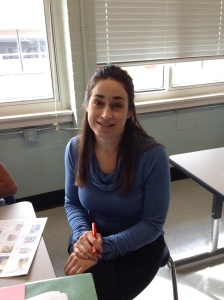Written by Vuong Truong |
How do students who don’t speak English learn at Morgan? I interviewed Ms. Gonzalez,the only ESL teacher at The Morgan School, Mrs. Cozzolino, who is a co-teacher at Morgan, Mrs. Brisson, Director of Special Services, and Antonio and Stevan, two ESL students who attend Morgan.
Ms. Gonzalez:
Ms. Gonzalez, Morgan’s ESL teacher, thinks foreigners are great; they bring diversity to the classroom. The support she provides for her students depends upon the students’ knowledge of English.
For example, Yerlin, one of Ms. Gonzalez’s students, spoke some English, so she reviewed what he should know and built from there. At Eliot she has a student who doesn’t know how to say hello in English. With this student, she has to begin with the basics. She shows a lot of pictures to her with words, and she lets her translate them into Spanish. She gave her some worksheets that require her to fill in the blank.
She also teaches a modified civics class. Ms. Gonzalez helps teachers either modify work for their ESL students, or she develops completely different assignments because the teachers don’t have a lot of time to modify work for ESL students. Ms. Gonzalez helps her students pursue their study of English. Some students get frustrated and give up. She makes sure that they don’t give up for long. She mentions that many ESL students in the U.S. drop out of school. She has never had any ESL students of hers drop out of school. She also understands that many ESL students move frequently and get frustrated when they have to start over again at a new school. She believes that all of her students feel welcome and have friends in school. Mrs. Gonzalez helps her students by being patient, understanding, and sympathetic.
She taught a student at Eliot named Daniela adjectives. She gave her 2 packets to work on, and she still didn’t have them done days later. Ms. Gonzalez was very frustrated, but she asked her in Spanish, “why didn’t you finish it? ” Daniela answered that she didn’t understand it. Ms. Gonzalez gave her an IPad to let her use Google translate. Daniela was then able to translate the word into Spanish. Ms. Gonzalez forgot to teach her how to translate words from English to Spanish. This was why Daniela didn’t do the homework. Sometimes she has some unrealistic expectations of students, and she has to learn from that.
Teachers need more training on how to modify the work. Ms. Gonzalez can’t modify everything because she is only one person. She especially can’t modify the material she doesn’t understand. In science she has difficulty understanding some of the complex science. If she does not understand it, she cannot help her ESL students with the material. Her students tell her that she is supposed to know everything. Most importantly, her students need to understand what they can or cannot do.
Mrs. Cozzolino
Mrs. Cozzolino, a special education teacher at Morgan, often works with ESL students in standard English classes. First of all, Mrs. Cozzolino tries to explain the text. She gives ESL students their own text so they can write and copy the article. Mrs. Cozzolino starts a conversation with them and helps them to understand the article. She helps them with the answer then lets them write it down again. “It’s difficult,” Mrs. Cozzolino confessed, but she “tries to engage the students as much as possible.” The amount of help the students need depends on how long they have been here and how comfortable they feel.
Mrs. Brisson

Photo via Clinton Public School.
Mrs. Brisson who oversees all of the ESL programs in Clinton described the elementary ESL programs. In the elementary program, the individual kids have a strong desire to learn English. The difference between the elementary and high school programs is that the elementary teachers train the kids, and they help everyone. In the highschool, the teachers help the kids the same way but take different approaches because ESL students, who don’t speak English well, have a more difficult time at the high school level. It’s harder for them to learn English. Another difference is the elementary level includes reading, writing and math. At the high school level, the students earn credit and face more challenges. Ms. Gonzalez notices the differences when teaching at the elementary school and high school. There is no rotation schedule at the elementary school like there is at the high school, and she feels that the elementary school is more flexible. The high school level is not flexible because the students are earning credits.
Most challenging at the high school for ESL teachers is that students come from multiple countries and speak many different languages. At the elementary level, they only speak Spanish. Mrs. Brisson feels fortunate that she has Ms. Gonzalez because Ms. Gonzalez understands Spanish. Older ESL students need to put effort into assignments and work. Mrs. Brisson would like to see more parents involved with ESL at Morgan. She would love to see more translators and advanced system technology. The ESL program has changed a lot. Fewer students were in the program in the 1950s. Now there are 60 ESL students in the school system. She used to not have an ESL teacher at all, and now she has ESL teachers.
Antonio and Stevan

There are currently 13 students at Morgan who are part of the ESL program. Two of these students are Stevan who speaks Portuguese, Arabic, English, and Spanish and Antonio who speaks Spanish and a little English. Stevan came from Guatemala, and Antonio came from Brazil.
Antonio said English is hard for him, but Stevan said English is easy for him. Antonio studies English by himself with others who help him. Stevan studies English by himself but he asks for help whenever he doesn’t understand. People treat Antonio and Stevan really well in school. The most difficult challenges are speaking in front of people and pronunciation.
Many people are involved in the ESL program at the Clinton Public Schools.





Jonathan • Apr 27, 2014 at 11:17 pm
Very informative article Vuong! I never knew much about the ESL Program until I read the article. Great job interviewing all three people. Keep up the good work!
dahlberg32 • Apr 10, 2014 at 1:47 pm
I enjoyed reading your article! I never knew where the ESL Program came from or what it did so it was very interesting and informative.